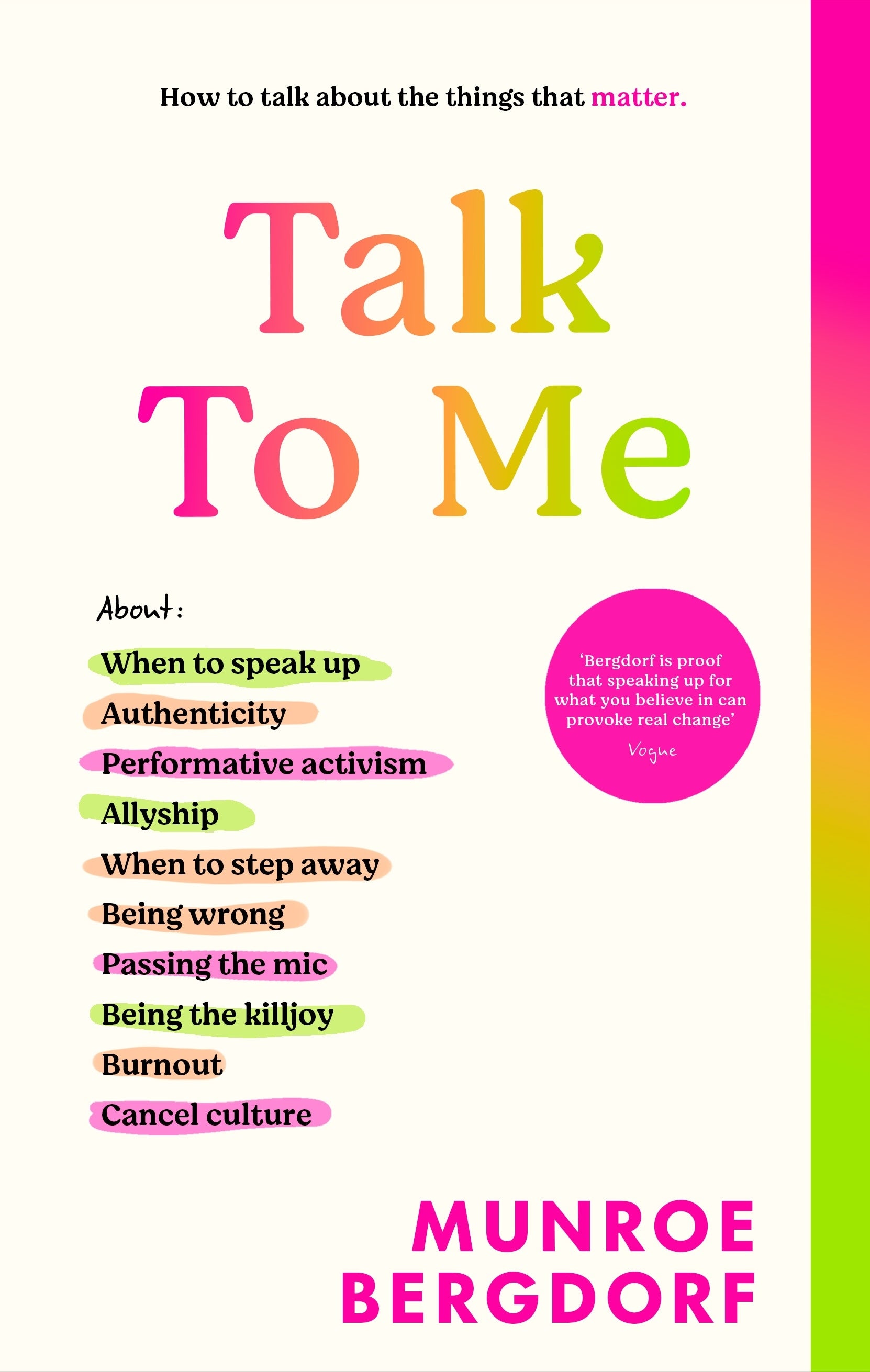ARTICLE AD BOX
Warning: This article contains themes of suicide and depression that may cause some readers distress.
Munroe Bergdorf used to think she could convince people. “I thought everyone could be talked around,” she says, fiddling with her fingernails. “And in recent years it has seemed like not only that people aren’t willing to listen to reason, but that we’re stuck in this conflict with each other where we don't even see each other’s humanity. I think it has actually been a real saving grace for me to see the humanity in the people that I disagree with and think, ‘Why are you like this? Where is this coming from?’”
Of course, there are limitations, particularly for someone like Bergdorf, a globally renowned trans activist, author and model. “You have to know when to disengage,” the 37-year-old adds, sitting in a colourful fabric-covered corner of a Soho restaurant, taking intermittent sips of pineapple juice.“If somebody isn’t willing to use my correct pronouns, talk to me like I’m a human being or understand that I exist and we need to find a way to live together, then there’s not really any conversation to be had.” And yet, it’s one that people seem to be continually forcing Bergdorf – along with every other trans woman in the UK – to have.
In April 2025, the UK’s Supreme Court ruled that trans women are not legally women under the Equality Act. To say this was devastating to trans communities would be a gross understatement. Under the new ruling, trans women with a gender recognition certificate (GRC) can be excluded from single-sex spaces if “proportionate”, though guidance subsequently published by the Equalities and Human Rights Commission stated that trans women “should not be permitted to use the women’s facilities” in workplaces or public-facing services, such as shops and hospitals.
Small print aside, the ruling turns trans women’s lives upside down, not least because of how it emboldened an already hyperactive (and hyper-online) transphobic community, vicious attacks from which Bergdorf has been subjected to repeatedly. “The majority of people in this country have never met a trans person,” she says, highlighting the Supreme Court’s choice not to include any trans voices in its decision-making process. Bergdorf recently took part in a campaign with the Good Law Project, alongside other trans activists, to say what they would’ve said in court had they been given the chance. “It’s so easy to demonise someone and something that you’ve never known personally. But even if someone has never knowingly met a trans person, they’ve been sharing spaces with trans people for decades. We’ve always been there.”
In times like these, it can be difficult to see the light. One solution, as posited in Bergdorf’s latest book, is to talk to each other – and crucially, to listen. A guide aimed at young adults, published this week, Talk to Me, is a toolkit to navigate difficult discussions amid the ongoing culture wars, whether the issues at stake are trans rights, beauty standards, reproductive healthcare, or cancel culture. The book draws on Bergdorf’s own experiences as an activist, providing insights and advice on meaningful allyship, how to speak up and avoiding what she describes as “performative activism”.
“I feel like we’ve entered this era where we talk to each other like politicians and we’re not really connecting,” she says of her impetus behind the book. “So much of how we view conversations, whether or not it’s on television segments or in debates, it’s like we’re consuming conflict or trying to ‘win’. I’m of the mindset that often the answer is in the grey [area] and it’s sometimes about compromise. But we’ve become so tribal in these incessant culture wars. And we’re never going to get anywhere if we don’t learn to live with each other.”

Of course, you’re not always going to be able to get through to someone. Trying to do so via social media platforms – which Bergdorf calls “billionaires’ backyards” – will only get you so far, given how much algorithms dictate what we do and don’t see. Bergdorf is regularly inundated with offers from TV and radio to “debate” trans issues, essentially forcing her to fight for her right to exist. While she would’ve accepted these offers at the start of her career, these days, she declines, knowing better than to comply with veiled attempts to sensationalise trans issues instead of supporting them. “I don’t think that we should be putting ourselves in the position of arguing or trying to empathise with people who are committed to violence,” she says, choosing her words carefully. “We wouldn’t expect a Black person to engage in a conversation with someone from a white nationalist organisation. But if people are committed to seeing the world in one way, sometimes you can’t convince them – and it’s not worth it to try.”
Talking to Bergdorf feels astonishingly easy despite the heavy subject matter. Eloquent, composed and always eager to highlight the positives, she radiates warmth and strength throughout the 90 minutes we wind up spending together. When so much is at stake, how does she hold it together? “Community,” she replies. “I don’t feel like I’m in this alone. Ultimately, I just want a better world where everybody can be who they are. And I think that’s not much to ask.”
A stint of sobriety has helped more recently, too – Bergdorf hasn’t had a sip of alcohol for the past five months. “I just wanted a really clear headspace, particularly with everything going on politically, feeling really uncertain and unsafe,” she explains, stressing that it won’t be forever. “As soon as I’m ready, I can’t wait to have that margarita.” It’s useful given how busy things are right now: on top of the book, Bergdorf is also releasing a documentary, Love & Rage, titled as such because, in Bergdorf’s words, “transitioning is the biggest act of love that you can give for yourself. And then rage because that is at stake.”
Directed by Olivia Cappuccini (whose credits include 2019’s Andy Murray: Resurfacing), the film chronicles her life to date, starting with her upbringing in a largely white, middle-class village in Essex, where Bergdorf, who is biracial, says of racism there: “We just didn’t talk about it.” It then charts her ascent into public life and its accompanying controversies, namely how in 2017 she was fired by L’Oreal for comments she’d written on Facebook in response to a white supremacist rally in Charlottesville, Virginia. The beauty conglomerate apologised to Bergdorf in 2020 and rehired her.
Professionally, I was on top of the world. But two weeks after I shot the cover of Cosmopolitan, I was in rehab with complex PTSD symptoms
Munroe Bergdorf
“I felt really traumatised, like white society just refused to talk about racism,” she says of the rally, which included members of the alt-right, neo-Confederates, neo-fascists, white nationalists, neo-Nazis and far-right militias. What she wrote – that “all white people” were racist – made headlines around the world, with Bergdorf facing opprobrium on a global scale. She received daily death threats. Watching her describe the impact of it all is one of Love & Rage’s most poignant moments.
There are other scenes like these, such as when she recounts the abusive relationship Bergdorf wrote about in her 2023 memoir, Transitional, as well as the difficulty of maintaining her own mental and physical health while her profile grew. “I shot the cover of British Vogue, Cosmopolitan, British GQ, Glamour and Rolling Stone in under a year,” she says. “Professionally, I was on top of the world. But two weeks after I shot the cover of Cosmopolitan, I was in rehab with complex PTSD symptoms.” This isn’t featured in the documentary. “There’s a lot that we didn’t actually include for ethical reasons,” she explains. Because there’s only so much you can share publicly when you’re still going through it? She nods. “There was just way too much that was going on. Now I look back and I don’t know how I managed to get through that time.”
Her health rapidly deteriorated after lockdown. “I was recording my podcast with Spotify and playing therapist with guests while I felt like I was having a breakdown. Half of my face froze from Bell’s palsy. My hair was coming out in clumps. I wasn’t really eating that much.” Bergdorf credits her partner at the time for helping her through it. “He was keeping me afloat. But other people can’t keep you afloat forever. You will crash eventually.”
She did. In 2022, Bergdorf’s ex-girlfriend, a trans woman named Ava, died by suicide at the age of 33. “It was Ava’s passing that forced me to stop,” she says. “I didn’t understand grief until then. It was like the colour had drained out of life and I’d be triggered by anything, or a tear would just roll down my face and I hadn’t even consciously started crying.” Of course, suicide is a particular kind of grief, one that can elicit feelings of guilt, shame and anger. Bergdorf has previously spoken about experiencing suicidal thoughts of her own. “I think unless you’ve been suicidal you can’t really understand suicide,” she says.

Bergdorf intends to take a break soon. Doing press for Talk to Me and Love & Rage involves putting a lot of herself on the line for the sake of her activism, which, in light of the Supreme Court ruling, feels more urgent than ever. And while she’s boundaried with it (“I’m good at taking pauses”), there are obviously moments where longer periods of stepping out of public life aren’t just advisable but vital. “I’ve got incredible friends and I’m lucky to have a career that I’ve worked really hard for,” she says. “But yeah, I do want some more time to myself.”
As well as going on holiday for the first time in a year and a half, Bergdorf plans to spend time with her boyfriend of six months, an actor she describes as “very, very intelligent and emotionally in tune”. Three years on from Ava’s death, meanwhile, grief is now something Bergdorf has learned to live with. “People live within you, I think,” she says, her voice quiet. “Seeing it like that helps me. It’s like I need to live more for the people that I’ve lost in whatever way. That their memory lives on within you, and you also need to make more of a concerted effort to make the most of the life that you have.”
If you are experiencing feelings of distress, or are struggling to cope, you can speak to the Samaritans, in confidence, on 116 123 (UK and ROI), email jo@samaritans.org, or visit the Samaritans website to find details of your nearest branch.
‘Talk to Me’ by Munroe Bergdorf is out on 5 June via Penguin
‘Love & Rage’ is screening at SXSW London, 6 June, and UK cinemas nationwide, 10-11 June









 English (US) ·
English (US) ·